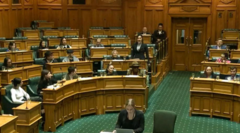Opposition MP Hana-Rawhiti Maipi-Clarke received a seven-day suspension, while co-leaders Rawiri Waititi and Debbie Ngarewa-Packer were banned for 21 days after performing the traditional haka during a parliamentary session. The bill that ignited the protest has since been voted down, highlighting ongoing tensions between the government and the Māori community.
Māori MPs Face Historic Suspensions After Protest Haka in Parliament

Māori MPs Face Historic Suspensions After Protest Haka in Parliament
Three Māori MPs have been suspended by New Zealand's parliament following their protest haka against a controversial bill aimed at redefining the Treaty of Waitangi.
New Zealand's parliament has made headlines as it voted to suspend three Māori MPs for their involvement in a protest haka during a contentious session last year. The traditional dance, performed by Opposition MP Hana-Rawhiti Maipi-Clarke after her party, Te Pāti Māori (Māori Party), was questioned on its stance regarding a divisive bill, has led to her being handed a seven-day suspension. Co-leaders Rawiri Waititi and Debbie Ngarewa-Packer faced even harsher penalties with a 21-day ban each.
The controversial bill aimed to redefine the country’s foundational Treaty of Waitangi and has since been voted down, stirring significant unrest. Despite New Zealand's reputation for championing indigenous rights, the relationship between the Māori community and the current conservative government has soured in recent times.
Last November, a video capturing the MPs performing the haka—a traditional war dance expressing defiance—went viral, drawing international attention. A parliamentary committee later deemed their actions could have "intimidated" fellow lawmakers, leading to their unprecedented suspensions. Prior to this, the longest suspension recorded was only three days.
In a poignant speech delivered on Thursday, Maipi-Clarke expressed her resolve, stating, "We will never be silenced, and we will never be lost," as she fought back tears in response to the penalties. Concurrently, New Zealand's Foreign Minister Winston Peters faced backlash after labeling Te Pāti Māori as a "bunch of extremists," prompting calls for an apology.
Holding six of the 123 seats in parliament, the Māori Party stands as a vocal representative for the Māori community. The proposed Treaty Principles Bill, which sought legal clarification of the Treaty of Waitangi—an agreement established in 1840 between the British Crown and Māori leaders during New Zealand's colonization—was ultimately voted down with a decisive 112 to 11 margin in April. Critics argued that the proposed bill would further deepen societal divisions, rather than unify the nation.
The controversy surrounding the bill ignited outrage across New Zealand, culminating in substantial protests, including over 40,000 people who rallied outside parliament during its initial reading last November. With these developments, the landscape of New Zealand's political discourse continues to evolve, particularly regarding the rights and representation of its indigenous communities.




















